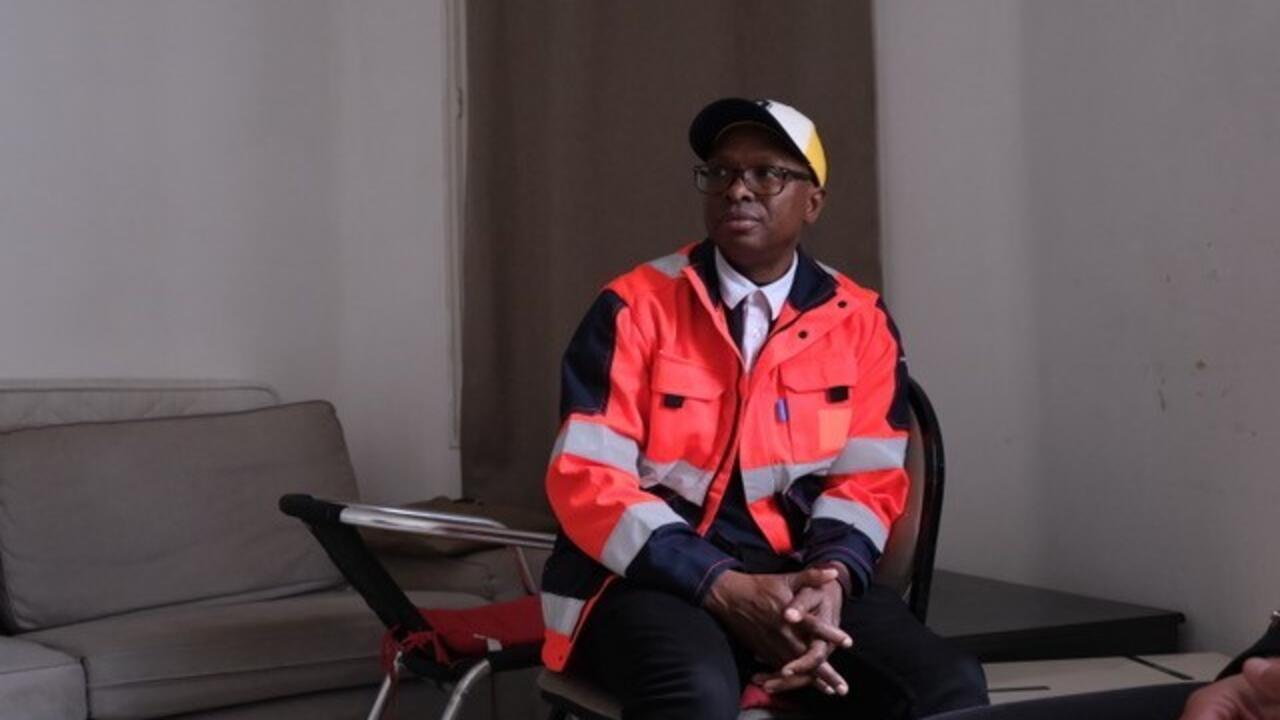Free portrait
Alieu Jalloh, refugee, activist and pragmatist
Alieu Jalloh in the temporary residence managed by the association of users of the PADA.
© Yoram Melloul / RFI
Text by: Yoram Melloul Follow
5 mins
Arrived in France at the end of 2017, Alieu Jalloh fights for the rights of asylum seekers in Marseille.
Marked by the poor reception given by France, he put in place simple and effective solutions to meet their immediate needs, particularly in terms of housing.
Advertising
Read more
From our correspondent in Marseille,
When Alieu Jalloh has an idea in his head, he usually follows through.
Since arriving in France in 2017, the 35-year-old refugee from Kabala Town, Sierra Leone, has struggled to find solutions for asylum seekers who arrived in Marseille.
He himself suffered from the poor support of France against those who came to seek refuge in the country.
“
I would never have imagined France like that!
For me, it was the country of human rights.
But when I arrived here, my rights were not respected”,
he is indignant.
In 2017, forced to leave Sierra Leone, he crossed the African continent then the Mediterranean and arrived in Italy.
Sick, he spent five months there before heading to France and Marseille.
In the second city of France, he knows no one and alternates between the street and emergency accommodation.
“
I was depressed and sick.
I could not rest while living on the streets.
In emergency accommodation, we were not allowed to stay inside during the day.
Being outside, in the cold, being sick… All that was suffering.
I even had suicidal thoughts
.
»
“
We had nothing more to lose
”
Alieu Jalloh finds a studio in February 2018. He rents it with a friend to a slum broker who presents himself as the owner.
Eight months later, the police knocked on his door.
“
The police told us that the building was not secure.
She got everyone on buses.
Those who had a lease were taken to the hotel.
The others, like us, in a gymnasium
.
It was still around fifty people.
»
The evening of their arrival, a policeman enters the gymnasium.
"
He told us, '
Tomorrow morning everyone has to leave.'
To leave, but to go where?
We had been kicked out of the building for security reasons.
And there, we are told that we have to sleep on the street.
How is it safer?
»
The fifty dislodged refuse to move and created the Dahdah collective, named after the street where the accommodation was located.
"
We said
: 'we don't leave the gymnasium if we don't have a place to sleep'"
,
recalls Alieu Jalloh.
The collective organizes demonstrations, and publicizes its cause, carried by the force of despair.
“
We were tired.
We had nothing more to lose
,” recalls the Sierra Leonean.
It's a victory.
The prefecture agrees to take charge of the displaced persons and accommodates them in hotels.
In 2019, several members of the Dahdah collective were victims of the malfunctions of what was then called the Reception platform for asylum seekers (Pada), which has since become Structure for the first reception of asylum seekers (
Spada
), the structure that takes care of making appointments for asylum seekers with the prefecture and the French Office for Immigration and Integration (
OFII
).
Temporary residence for asylum seekers
Alieu Jalloh then co-founded the association of users of the Pada, the only one in France exclusively composed of current and former asylum seekers.
It now has 500 members of 28 different nationalities.
The association holds a weekly legal office and prepares asylum seekers for interviews with the French Office for the Protection of Refugees and Stateless Persons (
OFPRA
) and the National Court of Asylum (
CNDA
).
“
There are people who arrive without speaking French or English, who have not been to school.
How can they get by on their own?
We speak several African languages.
Above all, the members of the association know the expectations of asylum seekers.
“
People don't need to talk to me, I know what they're going through.
I experienced it myself,
explains the refugee.
They are comfortable because we are among ourselves.
They can tell us their stories.
We've been there
.
»
Traumatized by his time on the street, he also fights for asylum seekers to have access to housing.
He doesn't want “
other people to go through the same situation
”.
Most of those who arrive are homeless.
“
75% of our members live on the street or in a squat
,” explains Alieu Jalloh.
In June 2021, with the association of users of the Pada, he prevented the eviction of forty members of the association who had entered a building in the city center, property of the Public Land Establishment.
Alieu Jalloh, accompanied by local associations, starts negotiations with the owner, the State and the town hall, to make this squat a temporary accommodation for asylum seekers.
“
It is not enough to be indignant, or to oppose.
You have to know how to be pragmatic and find concrete solutions to prevent people from dying in the street, ”
he explains.
It's a new victory.
In October 2022, a lease is signed with state support.
Residents legally stay in the building.
They undertake to leave it on March 31, 2023, the time to stabilize and organize their asylum application.
This temporary residence project is making noise.
“
I am invited to several towns in France to share my experience with other asylum seekers
,” explains Alieu Jalloh.
He fights so that other empty buildings can accommodate asylum seekers in Marseille, and everywhere in France.
Newsletter
Receive all the international news directly in your mailbox
I subscribe
Follow all the international news by downloading the RFI application
Sierra Leone
Africa
Lodging
Free portrait
our selection
Immigration
International Migrations
Refugees

